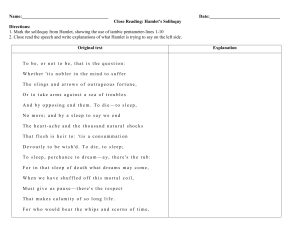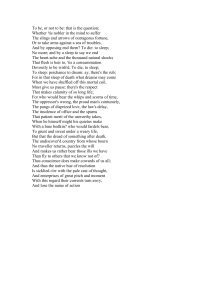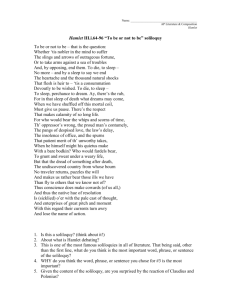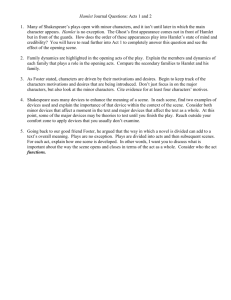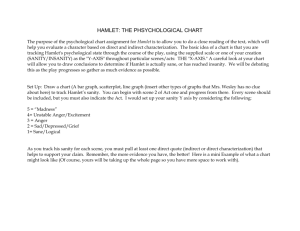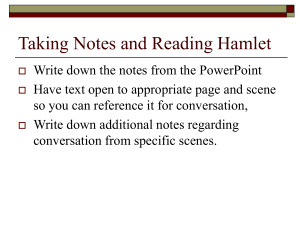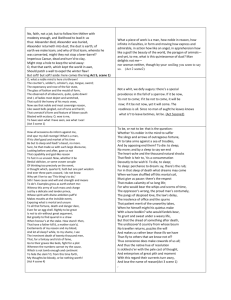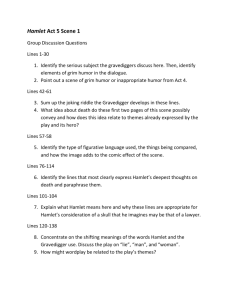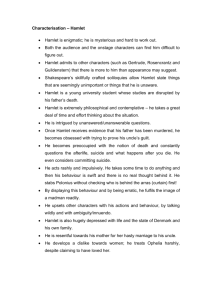Literary Terms
advertisement
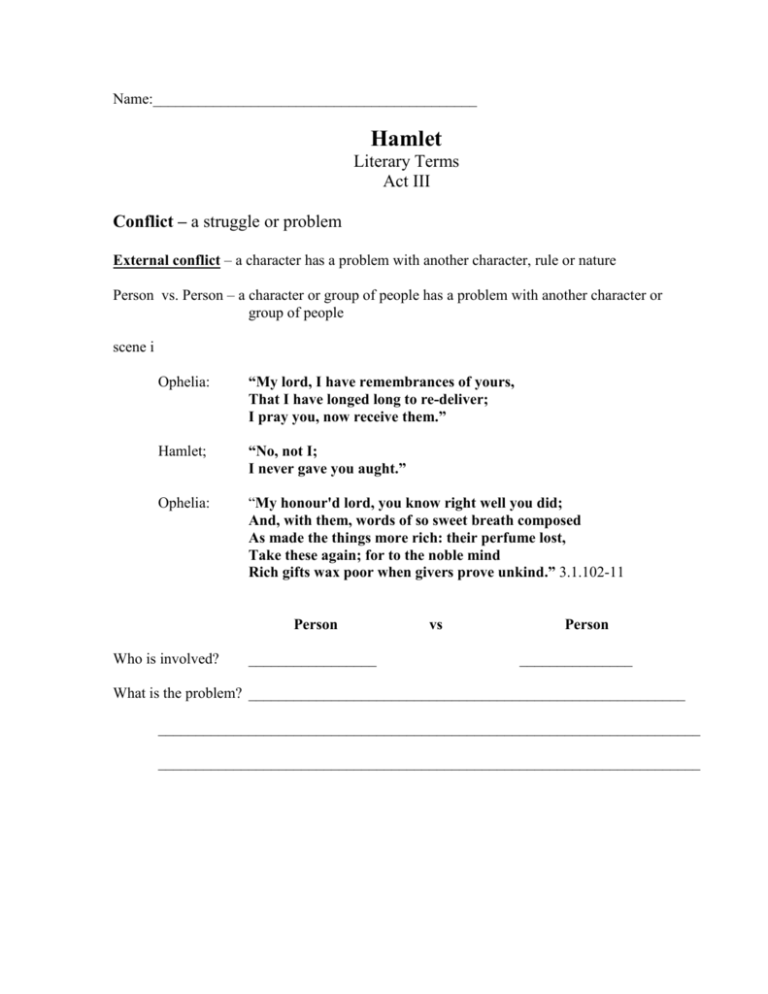
Name:___________________________________________ Hamlet Literary Terms Act III Conflict – a struggle or problem External conflict – a character has a problem with another character, rule or nature Person vs. Person – a character or group of people has a problem with another character or group of people scene i Ophelia: “My lord, I have remembrances of yours, That I have longed long to re-deliver; I pray you, now receive them.” Hamlet; “No, not I; I never gave you aught.” Ophelia: “My honour'd lord, you know right well you did; And, with them, words of so sweet breath composed As made the things more rich: their perfume lost, Take these again; for to the noble mind Rich gifts wax poor when givers prove unkind.” 3.1.102-11 Person Who is involved? _________________ vs Person _______________ What is the problem? __________________________________________________________ ________________________________________________________________________ ________________________________________________________________________ Scene iv Hamlet: “…Leave wringing of your hands: peace! sit you down, And let me wring your heart; for so I shall, If it be made of penetrable stuff, If damned custom have not brass'd it so That it is proof and bulwark against sense.” Gertrude: “What have I done, that thou darest wag thy tongue In noise so rude against me?” Hamlet: “Such an act That blurs the grace and blush of modesty, Calls virtue hypocrite, takes off the rose From the fair forehead of an innocent love And sets a blister there, makes marriage-vows As false as dicers' oaths: O, such a deed As from the body of contraction plucks The very soul, and sweet religion makes A rhapsody of words: heaven's face doth glow: Yea, this solidity and compound mass, With tristful visage, as against the doom, Is thought-sick at the act.” 3.4.41-60 Person Who is involved? __________________ vs Person ____________________ What is the problem? __________________________________________________________ ______________________________________________________________________ ______________________________________________________________________ Internal conflict -- a character has a decision or change that need to or want to make Scene i Hamlet: “To be, or not to be: that is the question: Whether 'tis nobler in the mind to suffer The slings and arrows of outrageous fortune, Or to take arms against a sea of troubles, And by opposing end them? To die: to sleep; No more; and by a sleep to say we end The heart-ache and the thousand natural shocks That flesh is heir to, 'tis a consummation Devoutly to be wish'd. To die, to sleep; To sleep: perchance to dream: ay, there's the rub; For in that sleep of death what dreams may come When we have shuffled off this mortal coil, Must give us pause: there's the respect That makes calamity of so long life; For who would bear the whips and scorns of time, The oppressor's wrong, the proud man's contumely, The pangs of despised love, the law's delay, The insolence of office and the spurns That patient merit of the unworthy takes, When he himself might his quietus make With a bare bodkin? who would fardels bear, To grunt and sweat under a weary life, But that the dread of something after death, The undiscover'd country from whose bourn No traveller returns, puzzles the will And makes us rather bear those ills we have Than fly to others that we know not of? Thus conscience does make cowards of us all; And thus the native hue of resolution Is sicklied o'er with the pale cast of thought, And enterprises of great pith and moment With this regard their currents turn awry, And lose the name of action.” 3.1.64-96 Person Who is involved? _________________ vs self ___________________ What is the problem? _________________________________________________________ ______________________________________________________________________ ________________________________________________________________________ Theme – the main idea or underlying meaning of a literary work. A theme may be stated or implied Mystery and intrigue Shakespeare continues this theme in Act III. He includes many ‘spies’ that hope to gain information about other characters. Scene ii Hamlet: “…There is a play to-night before the king; One scene of it comes near the circumstance Which I have told thee of my father's death: I prithee, when thou seest that act afoot, Even with the very comment of thy soul Observe mine uncle: if his occulted guilt Do not itself unkennel in one speech, It is a damned ghost that we have seen, And my imaginations are as foul As Vulcan's stithy. Give him heedful note; For I mine eyes will rivet to his face, And after we will both our judgments join In censure of his seeming.” 3.2.80-92 Who is Hamlet asking to spy on Claudius? ____________________________________ Why? ______________________________________________________________________ _______________________________________________________________________ _______________________________________________________________________ Scene iv Polonius: “He will come straight. Look you lay home to him: Tell him his pranks have been too broad to bear with, And that your grace hath screen'd and stood between Much heat and him. I'll sconce me even here. Pray you, be round with him.” Gertrude: “I'll warrant you, Fear me not: withdraw, I hear him coming.” 3.4.1-7;9-10 Who is spying on Hamlet? ___________________________________________ Why? ______________________________________________________________________ ________________________________________________________________________ _______________________________________________________________________ The Mystery of Death Hamlet continues to be obsessed with the idea of death. He continues to wonder if it would be the answer to all of his questions. Scene i Hamlet: “To be, or not to be: that is the question: Whether 'tis nobler in the mind to suffer The slings and arrows of outrageous fortune, Or to take arms against a sea of troubles, And by opposing end them? To die: to sleep; No more; and by a sleep to say we end The heart-ache and the thousand natural shocks That flesh is heir to, 'tis a consummation Devoutly to be wish'd. To die, to sleep; To sleep: perchance to dream: ay, there's the rub; For in that sleep of death what dreams may come When we have shuffled off this mortal coil, Must give us pause: there's the respect That makes calamity of so long life; For who would bear the whips and scorns of time, The oppressor's wrong, the proud man's contumely, The pangs of despised love, the law's delay, The insolence of office and the spurns That patient merit of the unworthy takes, When he himself might his quietus make With a bare bodkin? who would fardels bear, To grunt and sweat under a weary life, But that the dread of something after death, The undiscover'd country from whose bourn No traveller returns, puzzles the will And makes us rather bear those ills we have Than fly to others that we know not of? Thus conscience does make cowards of us all; And thus the native hue of resolution Is sicklied o'er with the pale cast of thought, And enterprises of great pith and moment With this regard their currents turn awry, And lose the name of action.” 3.1.64-96 What does Hamlet compare death to? _________________________________________ What is his fear about death? ____________________________________________________ ______________________________________________________________________
